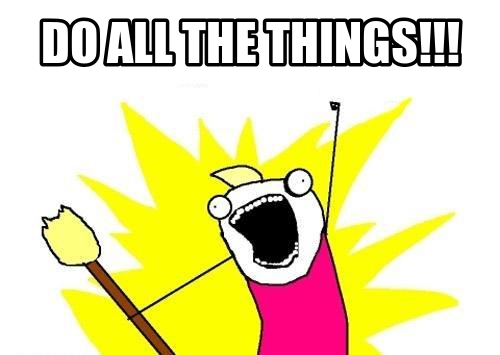I’ve made it no secret since David and I were married that I had no plans of giving birth to my own children. For a while, I even swore off children completely. I had good arguments for not having my own children, some of which are: I thrive in quietness and alone time, I like the freedom of being able to come and go when the mood strikes, and I’ve noticed that many people who do have children turn the entire focus of their lives on their family rather than trying to do some small good in the world. I’ve also never had the desire to be pregnant (the thought gives me a panic attack), unlike some women.
Now, in recent years we’ve discussed the possibility of adopting a child, which I’ve come around to. There are also good reasons for adoption, but I won’t go into them here. The point is: children and family-building are now on my radar.
That said, what really turns me off the most to the idea of having children are the virulent attacks against women who choose to have a career and a child. When Indra K. Nooyi, the CEO of Pepsi, came out and talked about how hard it is for women to balance career and family (and she chose to privilege her career over her family), my friends flipped out and tore her apart. She was decried for her villainy (“What a sad person! Why did she even bring a child into the world if she’s not going to stay home and lavish her attention on it? Children are the greatest gifts a women can get” and so on).
And I see this happen all the time to women who choose to work. Those women who want a degree of independence, want to give back to those other than their family members, or who can’t afford to not work a full time job are lambasted and declared to be “bad mothers” or insufficient. My own mother had to work a full time job because she was a single mother with five children. She also mentored numerous young women outside of my family. And I have never, ever felt as if my mother was insufficient or did not love me. In fact, I treasure the fact that she worked hard and did not marry again for the convenience of staying home. She taught me that women can have high standards for themselves, they can work hard and contribute to family and community, and that they can still be awesome, caring mothers.
I know that much of the negative sentiment that SAHMs express comes from a sense of insufficiency themselves. They’ve created this imaginary world, though, where working women like myself must think that they are awful, stupid people who should not be respected for their decision to stay home. Because they’ve created this imaginary paradigm, they attack those moms who work.
I think that this working-mom-hating attitude is also a cultural shift toward something that I’ve deemed here “The Cult of the Child.” In the US, people are encouraged to give up all of their own interests and goals in order to give their children the utmost attention (constant, hovering attention); to be their child’s constant advocate; to plan out every minute of their children’s lives with activities and educational fun; and to not let their children experience hardship or struggle. Commercials advocate for this kind of life, as do shows like Modern Family (but does anyone really like Clare?).
I also see this kind of worship as a college instructor and advisor. Parents hover and micromanage and arrange their grown up children’s lives even after they leave home. My students ask their parents for paper topic ideas, parents fill out their children’s college applications and select their majors, and parents tell their children what they must do for a future career (this is the saddest part for me). My students have been worshipped their whole lives and have been told what to think about the world, and then they come to my classroom and find themselves backed into a corner where they have to start considering ideas and discovering that everything they do and think isn’t perfect.
Contrast this with my childhood. My free time was full of activities of my own creation. We didn’t have a lot of money for toys and gadgets, so my siblings and I invented stories and played outside in Grandma’s old clothes. We built forts in the woods and spent copious amounts of time reading books (all of my siblings are readers). I wrote poetry and worked on a “novel” and learned how to sew and embroidered and painted pictures. My mom let me talk and reason through ideas on my own and did not tell me what to do with my life. I can never remember my mom telling me that I should choose a major or career. Instead, she encouraged me to develop my strengths and let me come around to ideas about the world on my own.
I didn’t need my mom to plan out my daily activities because I learned how to form my own interests and developed skills on my own. And because of this, I learned how to make my own decisions and consider solutions to problems (and solve these problems myself) and I was ready to be an adult when I arrived at college.
When I adopt a child, I will be a working mother. I will work full time in a career that I love (teaching!). I will work full time because we need the money, and I will work full time because I love to work and engage with people. I will also continue to help people and be concerned with issues which affect my communities and the world. And hopefully my child/ren will also consider my decision to allow them to become their own, independent selves one of love.


